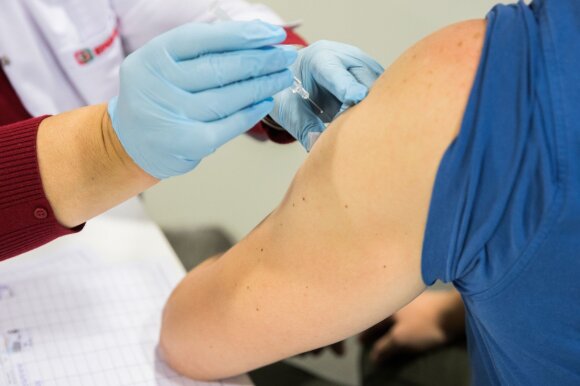
[ad_1]
– The medical system is going through really difficult times. Has the current situation stopped women’s visits to the doctor?
– Definitely not the case, we work as usual in the Santara clinics, outpatient visits are done as usual. Only scheduled operations are canceled and operate on an urgent basis.
– Is it known how many women have cervical cancer? How do these cancers look in other disease statistics?
– Approximately 400 new cases of cervical cancer are diagnosed each year. About half of them die. In 2019, 191 women died. It is a disease of young women compared to other oncological diseases. Among women ages 15 to 44, this cancer is the first most common.
– When we talk about mortality from oncological diseases, we keep saying that lung and stomach cancer is extremely dangerous. What Makes Cervical Cancer Unique? You mentioned that even half the women are lost.
– The 5-year survival rate in Lithuania is one of the lowest in Europe. The saddest thing is that this cancer is completely preventable. It doesn’t really evolve very fast. Decades have passed since the first changes were noticed and avoided in time. We diagnose a cancer that has already spread, which means that the woman has not been seen by any gynecologist for a long time.
– What percentage of young women can get cervical cancer?
– The peak of cervical cancer occurs between 35 and 45 years. These are really young women.

Žana Bumbulienė
– It is known that one of the factors that causes this cancer is the human papillomavirus. We have heard a lot about it, but maybe you can still explain what it is through the virus, how many women carry it, and is it so easy to get infected?
Papillomavirus is a sexually transmitted infection that is very common in our population. It is estimated that 70-80% of people will definitely be infected with this virus. These are big numbers. The good news is that many clear this infection from their body within 2 years. 10%, unfortunately, but the virus remains and its long-term condition is responsible for the appearance of the oncological process, the gradual development of cancer cells, and if they go unnoticed, everything turns into cancer.
– This virus, as I understand it, can infect and infect others and men?
– Of course, both sexes have this infection. The most interesting thing is that you may not experience any symptoms, but have the papillomavirus and pass it on. The infection can also be transmitted through skin contact, not necessarily just through sexual contact.
– Probably not dangerous for the men themselves?
– Dangerous for men too. We know that the human papillomavirus is responsible for almost all cases of cervical cancer – 99 percent. But it is also responsible for anal cancer, for both men and women. The anus is believed to be a reservoir for this virus. Causes changes in the external genitalia, vagina, penis. HPV also causes non-malignant diseases like genital warts. Mouth and throat cancers are also caused by this virus, about 70 percent. their cases.
– However, this virus can be prevented by vaccination. What is the situation in Lithuania with vaccines? Are children vaccinated?
– In Lithuania, 11-year-old girls are vaccinated with a bivalent vaccine. However, there are several types of vaccines because there are many types of HPV. Some are high-risk cancer-causing agents, others cause genital warts or other diseases. There is a worldwide shift to a nine valence vaccine that protects against 9 types of viruses instead of 2. A bivalent vaccine protects against 70% cervical cancer cases, and nivalent 90%. The difference is huge. We are not just talking about cervical cancer, it is protection against anal, oral and pharyngeal cancer.

– Do you think the state takes enough care of this disease if only 11-year-old girls are vaccinated with the bivalent vaccine? Shouldn’t children get vaccinated too?
Yes, if we want to align ourselves with the best examples, we should see how this is done in Australia, which has said it will eradicate the disease completely. They vaccinate both boys and girls and vaccinate children of all ages. In Lithuania, it is also necessary to vaccinate a larger group of children and children, and switch to a nine-valence vaccine. About 80 percent. Children of this virus in Australia are vaccinated and cervical cancer becomes a rare disease. In another 10 years, they hope this cancer will not go away at all.
– Let’s talk about the type of prevention we have now in Lithuania. Starting at age 25, women can get a cervical cancer test for free. Are we taking advantage of this opportunity or are women taking care of their health?
– Yes, women care about their health. More than 100,000 of these studies are conducted each year. Again, this is far from all women. Unfortunately, only half of the women who should attend benefit from this program. That is why we are at the forefront of the European Union in terms of cervical cancer incidence.
– What does this study show? Can there be precancerous changes and what do they mean?
– There may be precancerous lesions, they are at various levels. Some are just beginning to develop, others are already advanced. All this is indicated by the preventive examination, from your answer there are guidelines on what to do next.

– What are the treatments? The sooner the changes are seen, the better the treatment results.
– Once the initial changes are detected, there is a good chance that the disease will regress. Only a small fraction of the initial changes, perhaps only 1 percent, can progress to cancer. If the changes are advanced, they must be removed – the altered area is removed. In this way we protect women. However, after such treatment, the woman should be vaccinated to protect her from other HPV-related diseases.
– You mentioned the vaccine when you were an adult or if you already have a disease. Is vaccinating an adult worth your money?
– It’s definitely worth it. This is the only protection we can help ourselves with. The prophylactic examination is already a search for changes. We are vaccinated against the most aggressive types of viruses, which can make the oncological process develop much faster.
– If a woman does not know, but is already a carrier of this virus, can she still get vaccinated?
– Of course. Whether you have that virus or not, you can get vaccinated. Even after a case of HPV infection, no antibodies are formed. This means that it can become infected again. At that point, the vaccine provides immunity that fights HPV infection. <...> HPV has been found to affect male fertility, making sperm less viable. If a woman has had surgery for cervical cancer, it may have a major impact on fertility.

– To summarize our conversation, what to look for to avoid cervical cancer and all the dire consequences?
– First of all, we should talk about risk factors. It has been found that HPV is more likely to develop when you have early sex, when you have many sexual partners, if you have a disease that weakens your immune system, if you have another sexually transmitted infection, you can develop micro-injuries. they are exposed to infection and HPV. Much depends on sexual behavior. There are two things that can help prevent cervical cancer: participating in screening programs and vaccinations. Cervical cancer, especially in the early stages, has no symptoms. For this reason, visits to the gynecologist are recommended at least once a year. Free prevention programs run from age 25 every three years to age 60.
– When should you go to the gynecologist immediately?
– So if something has changed in your body, something is not like before. For example, bleeding or pain occurs. You better come see if that’s not a big deal. Clearly, it is best to come preventively.
It is strictly prohibited to use the information published by DELFI on other websites, in the media or elsewhere, or to distribute our material in any way without consent, and if consent has been obtained, it is necessary to indicate DELFI as the source .
[ad_2]